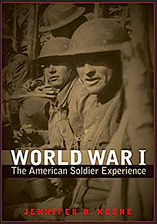A WRITER'S WIT |
My Book World

American Soldier Experience. Lincoln: U
of Nebraska, 2011.
I was drawn to this book by way of C-SPAN’s Book-TV, when I viewed the author’s presentation. At the time I was writing a piece about my grandfather who served in World War I. He’d left behind a number of letters and other documents about his experiences, but he talked little about what happened in battle, even when interviewed. I sought out this source to see if Keene might fill in some blanks for me and was not disappointed.
At the beginning Keene offers a fine timeline of WW I events from 1914 to 1936, when Congress finally votes to award the veterans their war “bonuses.” (The problem of post-war care for veterans has reemerged for those returning from the current wars in the Middle East.) She offers a map so one can see how European boundaries are drawn at the time. Among other topics, Keene covers the role the United States plays in the First World War, that it does not enter until 1918. She discusses the role of conscription and how that first draft operates. She also covers the role government plays in attempting to influence soldiers’ moral fiber while boosting their morale. She sheds light on the role that women, African-Americans, and foreign-born citizens play in the war—how they are mistreated and not always recognized for their important roles. She discusses the wounds of war, not just from the American point of view, but with regard to the French, Germans, the Russians, and others. And finally, the author covers the delays troops experience returning to the U.S. once peace has been brokered. The army sets up huge embarkation centers in France to make sure, among other things, that the troops are healthy, have been deloused, and been given new uniforms for their transatlantic crossing to the New York harbor.
Throughout the book Keene traces the effects of two important decisions President Woodrow Wilson makes at the time. One, he determines that the U.S. shall send a large conscripted group of soldiers to Europe. The fact that the French have been fighting for over four years means that they need reinforcements that will endure against the Germans. And two, Wilson instructs General Pershing to keep the US Army separate from the French and British troops. Wilson doesn’t like the idea of the Americans being subsumed by French or British forces, and his demand may help to win the war, because Pershing brings several innovations to combat, including the idea of open warfare, driving the enemy out into the "arena" between both armies.
I am bothered, however, by a number of troublesome errors in the text. One wonders if these errors appear in the original Greenwood Press edition or if only in the University of Nebraska edition. Some of these amount to more than mere spelling typos; there are poor word choices, additional words inserted where they do not belong, all representing sloppy copyediting, particularly for an academic press:
“The anger that British propagandists formented in the United States against Germany . . .” (8). [Fomented is the word the author probably intended to use.]
“In either case, the ability to effectively [to] move goods and men overseas was critical . . .” (9).["To" is extraneous.]
“Over the next few weeks, recruits lined up for the rest of their standard army [entire] attire, including olive drab wool pants and jacket” (45). [Author must mean "attire," not "entire."]
“Lack of sympathy between black troops and their white officers was a [reoccuring] recurring problem throughout the war . . .” (96) [“Reoccuring” is not a word.]
“Black officers only served in combatant units, where they faced constant charges of cowardice and ineptness” (97) ["Ineptitude" is probably a more elegant choice here.]
“Sometimes a soldier did not know that he had been exposed to mustard gas until it was too late and he [became] began vomiting . . .” [Author must mean "began," not "became."]
“There was some evidence that the stress of war caused the return of a previous mental [aliment] ailment in a grotesquely exaggerated way” (170). ["Ailment" is clearly misspelled.]
“In veterans’ hospitals, men learned to use prosthetic limbs, underwent reconstructive surgery, and received care for [reoccurring] recurring respiratory ailments” (177).
“The American Legion was formed to help men with some of these endeavors . . .” (182). [“Was” is not necessarily needed, as it creates a passive construction, yet it may make the sentence easier to understand.]
The fact that so many errors appear in a document issued by an academic press is a bit worrisome. If it is part of a trend, rather than existing as an anomaly, I think it would tend to weaken the reputation of the press.
NEXT TIME: New Yorker Fiction 2017



 RSS Feed
RSS Feed